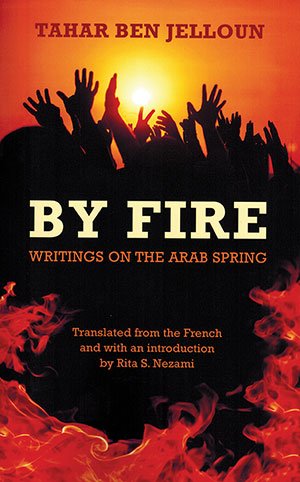
Many, even from the Middle East, do not understand what happened with the Arab Spring. In the September issue of World Literature Today, a major publication honored by the Nobel Prize Committee, I review a book by an important a modern author: Tahar Ben Jelloun's By Fire: Writings on the Arab Spring. For anyone seeking to understand the desperation and hope that led to these series of revolutions (& their unfortunate aftermath), I highly recommend this book.

By Fire: Writings on the Arab Spring by Tahar Ben Jelloun (& Translated by Rita S. Nezami)
Where does one begin to speak of the Arab Spring, after all that has been expended in dreams, analysis, and lives? In By Fire, Tahar Ben Jelloun, Moroccan intellectual and one of the most acclaimed novelists writing in French today, attempts to creatively rescue from the ashes Mohamed Bouazizi, the self-immolating fruit vendor credited with igniting the Tunisian revolt.
This slim novella, the first fictional account to tackle the subject, was initially published in 2011 at the height of the protests. Gracefully translated, with an illuminating and exhaustive introduction, by Rita S. Nezami, By Fire is a work of imaginative empathy and real compassion. Upon reading the work of fiction in one sitting, Nezami spontaneously combusted into translation: “There are urgent stories out there that need to be told in as many languages as possible and made available to world readers.”
Ben Jelloun, for his part, trusts in the power of literature to enflesh a symbol, lend voice to silent masses, and get to the heart of a human drama more powerfully than any news report might. “I focused on Mohamed’s story,” he says in an interview. “I closed my eyes, I saw it, and I wrote it. Beyond the specific situation in Tunisia, Mohamed Bouazizi became a valuable symbol for all cultures and all countries in pursuit of dignity.”
Also collected in this slender volume are Ben Jelloun’s nonfiction accounts of the political backstory, The Spark. Here, he categorically condemns dictatorship and police brutality in Tunisia and throughout the Arab world, contrasting their cruelty and corruption to the living poem of an oppressed people rising up in peaceful resistance (specifically, in Tunisia and Egypt).
All first-rate poetry is occupied with morality, according to T. S. Eliot; and By Fire, in its quietly lyrical way, is above all a moral book. Reading it is meant to prick our conscience and disturb us, as we consider the pitiable conditions and institutionalized injustice that push a human being to use his body as a last site of protest, to die in order to be heard. Together, the nonfiction and fiction sections complement one another in telling the humiliating life story of our desperate protagonist, from the inside and out, with plainspoken and urgent prose. “Despair is betrayal” was one of the slogans of the Egyptian Revolution, urging people not to lose hope in change. In that sense, this is not a despairing work but a reminder of what was once possible and what is still at stake if—through ignorance, apathy, or worse—we look the other way when confronted with the suffering of millions of innocent others.
© Yahia Lababidi


[Image & to learn more about the Arab Spring: https://www.history.com/topics/arab-spring]
We’re there any lasting positive changes that came from all those people’s sacrifices? I remember watching Tunisia and thinking, “History is happening right now” and then... not much.
Posted using Partiko iOS
Huge question... My feeling is that a point of no return was crossed, where people said enough is too much and overcame fear of their dictators. (Who knows, if they did it once, they can do it, again). Are they better off, now? Long, windy sigh Hugely debatable, and every country is different, of course...
Thanks for this Yahia! Sounds like a must read for those interested in the topic. Were you in the region during Arab Spring?
Glad it caught your eye, Eve! I was not in the region, at the time; my first trip back to Egypt (in years) was last year. But, I do have family and friends on the ground (many of whom are journalists, artists, etc...) and have written at some length on this subject. If interested, you can find some of my essays, here, pre/during/post Egyptian Revolution:
https://newint.org/author/Yahia%20Lababidi
oh I will definitely read that! Thanks for the link!!! =)
Royal you artical superb my frnd
Whaaaaaaat?!?
Hello yahialababidi
You are welcomed by the service of FreeResteem.
We want to bring more people to your post.
If you like our service then put a upvote under this comment.
Thank you for remain with Steemit.
Hmm...